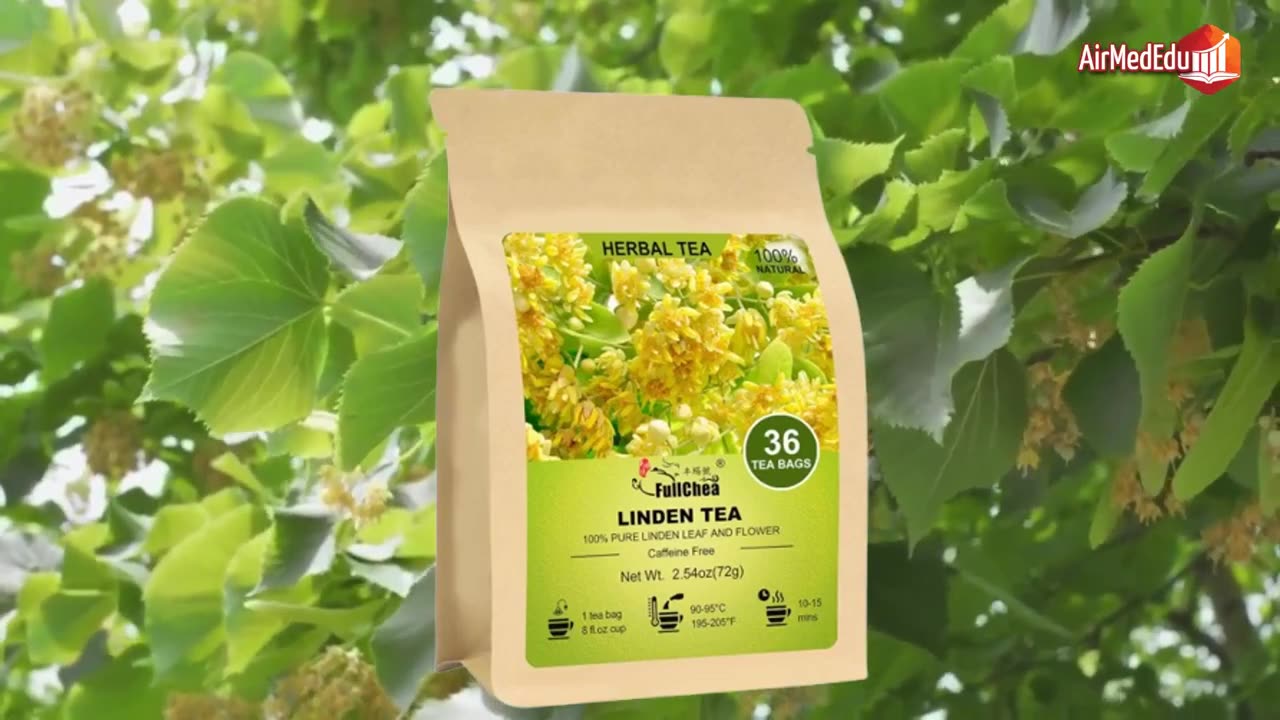Premium Only Content

Linden Tea, a Natural Ally for Health in Adults 40 to 65 Years of Age
Linden tea, made from the flowers, leaves, or bark of the linden tree (Tilia genus), has been valued for centuries in traditional medicine for its soothing properties and potential to promote general well-being. For adults aged 40 to 65 years and older seeking to improve their health naturally, linden tea offers specific benefits supported by its chemical composition and pharmacological effects.
The pharmacological effect of linden tea stems from its rich composition of bioactive compounds, such as flavonoids (quercetin and kaempferol), essential oils, mucilages, and tannins. Flavonoids act as antioxidants, neutralizing free radicals that cause oxidative stress, a relevant factor in aging and chronic diseases. Essential oils, such as farnesol, contribute to its mild sedative properties, while the mucilages provide a soothing effect on mucous membranes. These compounds interact with specific body systems, promoting benefits detailed below, focusing on organs and systems relevant to the population aged 40 to 65 and over.
In the nervous system, linden tea exerts a mild anxiolytic and relaxing effect. Flavonoids and essential oils modulate the activity of the neurotransmitter GABA (gamma-aminobutyric acid), which inhibits neuronal overexcitation, reducing anxiety and improving sleep quality. This effect is particularly valuable for older adults, who often face sleep disturbances or stress related to hormonal or lifestyle changes. Furthermore, by promoting a state of calm, linden tea can positively influence the circadian system, helping to regulate sleep-wake cycles, resulting in more restful sleep.
In the cardiovascular system, linden's antioxidants, especially flavonoids, contribute to the protection of blood vessels. These compounds reduce oxidative damage to arterial walls, improving vascular elasticity and decreasing the risk of hypertension. Studies suggest that flavonoids may inhibit lipid oxidation, a process implicated in the formation of atherosclerotic plaques, thus supporting heart health in older adults, where cardiovascular disease is a common concern.
The digestive system also benefits from the properties of linden tea. Mucilages, which are polysaccharides, form a protective layer over the gastric and intestinal mucosa, soothing irritation and promoting intestinal motility. This may be helpful for those experiencing digestive discomfort, such as reflux or slow digestion, common at this stage of life. Additionally, the tannins present have a mild astringent effect, which may help reduce inflammation in the digestive tract.
In the immune system, linden's antioxidants support immune function by reducing oxidative stress, which can weaken the body's defenses. Although not a direct immunostimulant, linden tea may contribute to a healthier cellular environment, allowing the immune system to function more efficiently, which is crucial for preventing infections in older adults.
Regarding the emotional system, the calming effect of linden tea may help mitigate feelings of anxiety or tension, promoting a state of emotional well-being. This benefit is indirect but significant, as chronic stress can exacerbate health conditions in this population. Furthermore, by improving sleep quality and reducing anxiety, linden tea may have a positive impact on the cognitive system, supporting mental clarity and concentration, which are often affected by insomnia or stress in older adults.
For the respiratory system, linden tea has a mucolytic and calming effect due to its essential oils and mucilages. It can soothe irritation of the respiratory mucosa, facilitating breathing in cases of colds or mild allergies, which is relevant for older adults with more vulnerable respiratory systems.
No direct effects of linden tea have been identified on other systems, such as the musculoskeletal, renal, endocrine, reproductive, integumentary, ocular, auditory, olfactory, gustatory, vestibular, thermoregulatory, hematopoietic, bone, dental, pilosebaceous, apocrine, sebaceous, sweat, pilomotor, or sensory systems. However, its impact on overall well-being may indirectly influence the health of these systems by reducing stress and improving sleep.
The standard recommended dosage for linden tea is 1 to 2 cups per day, prepared with 1-2 grams of dried flowers per cup (approximately 200 ml of hot water). It is recommended to steep for 5-10 minutes. It is important not to exceed this amount, as high doses can cause gastric discomfort in some people. Precautions include avoiding its use in people with known allergies to plants in the Malvaceae family, to which linden belongs. Although safe for most people, those taking sedatives or blood pressure medications should consult a doctor, as linden tea may potentiate these effects. Pregnant or breastfeeding women should avoid its use due to the lack of specific studies in these groups.
In summary, linden tea offers significant benefits for adults aged 40 to 65 years and older, supporting the nervous system by reducing anxiety and improving sleep, protecting the cardiovascular system through antioxidant action, relieving discomfort in the digestive system, indirectly strengthening the immune system, and facilitating respiratory function. It also contributes to emotional and cognitive well-being and helps regulate the circadian system. However, these benefits must be integrated into a holistic health approach. A balanced diet rich in fruits, vegetables, lean proteins, and healthy fats, along with regular exercise and adequate sleep habits, is essential to maximize the positive impact of linden tea. It should not be considered a substitute for medical treatments, but rather a natural supplement.
For those who wish to incorporate linden tea into their routine, it's essential to consult a doctor or nutritionist to ensure it's appropriate for their health and current medications. Making informed decisions is the first step toward healthy, active aging. Start today by exploring how linden tea can be part of your well-being!
-
 1:09:52
1:09:52
VapinGamers
3 hours ago $4.87 earnedTools of the Trade - EP11 Highs and Lows of Streaming with Gothix - !rumbot !music
10.7K2 -
 LIVE
LIVE
SOLTEKGG
4 hours agoARC RADIDERS "First Month-Anniversary on Rumble"
170 watching -
 2:14:09
2:14:09
LFA TV
21 hours agoRUMBLE RUNDOWN WEEK 6 with JEREMY HERRELL AND SHAWN FARASH 11.15.25 9AM
160K7 -
 1:44:16
1:44:16
HotZone
6 hours ago $4.81 earnedLive: The Hidden Crisis in US Special Ops: What They’re Not Telling You About Women in Combat
13K14 -
 53:25
53:25
Athlete & Artist Show
20 hours ago $1.38 earnedBombastic Bets & Games w/ Team Canada Veteran!
11.5K1 -
 53:13
53:13
X22 Report
5 hours agoMr & Mrs X - It All Revolves Around Marxism, Think Political Correctness, Midterms Are Safe - EP 16
74K19 -
 44:27
44:27
I_Came_With_Fire_Podcast
11 hours agoThe Right's Drift into Neo-Marxism & America's Populist Crossroads
12.7K7 -
 LIVE
LIVE
Amarok_X
4 hours ago🟢LIVE 24 HR STREAM? | ARC RAIDERS TO START | OPERATION 100 FOLLOWERS | USAF VET
30 watching -

Pepkilla
4 hours agoDay 2 of Camo Grinding Black Ops 7 ~ Until My Brain Rots
5.96K1 -
 27:34
27:34
marcushouse
6 hours ago $1.47 earnedWOW! I Was NOT Ready For This One… 🤯 | Starship & New Glenn Lead The Race!
4.65K2